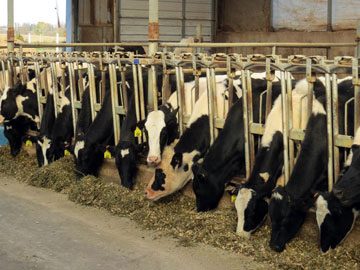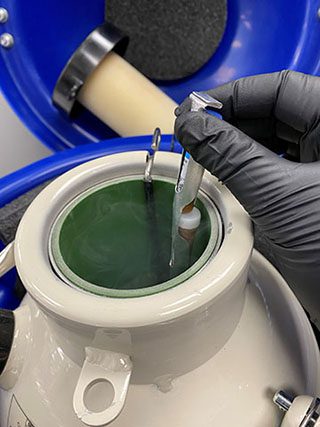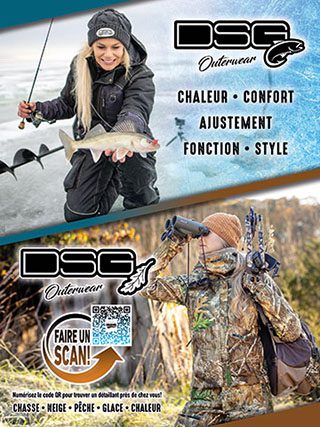WEDC grants open doors for travel, translation, and transportation
Dairy farmer Tom Kestell wanted to ship cow embryos to Tanzania.
Lynn Marsh’s goal was to transport her company’s heavy road maintenance equipment to a major trade show in Germany.
Michael Hendrickson envisioned an enthusiastic market in Europe for his company’s motor neurons, or nerve cells.
Wendy Gavinski had a hunch that women in Canada’s Quebec province would want to buy her company’s outerwear.
What do these leaders of vastly different businesses have in common? They all received grants from WEDC’s International Market Access Grant (IMAG) Program to pursue their export plans.
“Our world is getting smaller and smaller. I think if you don’t look at the world as your marketplace—at least, exploring where your products have a fit—you’re probably leaving a lot of sales on the table,” says Marsh, who is president of Delafield-based Road Widener.
IMAG grants ease export complications
The IMAG Program, launched in 2014, lets Wisconsin companies get reimbursed for specific expenses connected to an export project that will help them boost their presence in an international market.
“The IMAG has supported nearly 400 companies in growing their export sales,” says Katy Sinnott, WEDC vice president of global trade and investment. “Our goal is to help these companies lay the foundation for a new export strategy or accelerate an existing strategic export plan by assisting them with export development costs. By expanding their international reach, these companies can grow their sales, broaden their customer base, and increase their valuation.”
Wisconsin companies can receive up to $10,000 per annual application and as many as three grants through the program in all. If company leaders have completed the ExporTech™ Program—which helps businesses develop a customized export strategy—they may qualify for up to $25,000 a year and as many as six IMAGs over the company’s lifetime.
Ever-Green-View

Breeding-age heifers at Ever-Green-View farm
Tom Kestell modestly describes himself as a third-generation farmer who has been milking cows for more than 60 years. Kestell, his wife, Gin, and their son and daughter-in-law, Chris and Jennifer, own Ever-Green-View farm in Waldo, a dairy operation that the Holstein Association USA has named a Herd of Excellence for 12 years. Milk from the 130-cow herd is transformed into Italian cheeses at a local cheese factory. Meanwhile, a related business sends the farm’s products much farther afield: Tens of thousands of its bovine embryos have been shipped overseas to help nurture the dairy industry in countries around the world. Over the past 40 or more years, Ever-Green-View’s embryos have been sent to more than 30 countries.
“We’re one of the largest exporters of embryos in the world,” Kestell says. Destinations in 2022 included Tanzania, Pakistan, China, Japan, Russia, and Canada.
Tanzania was a new addition—Ever-Green-View’s first sale in Africa–and a $10,000 IMAG helped make it happen. Kestell had met representatives of a fledgling Tanzanian dairy farming operation at a seminar in the United Arab Emirates. But with travel curtailed by the COVID-19 pandemic, Kestell couldn’t follow up in person, so the IMAG funds let the farm hire consultants who facilitated the sale.
“It’s the very beginning of modern dairy farming in Tanzania,” Kestell says. Ever-Green-View embryos carry the same genetic makeup as the award-winning cows on the Waldo farm, and that could increase milk production in the African nation. Kestell says he looks forward to visiting Tanzania and sharing his knowledge of dairy farming.
“I think about improving Holstein genetics around the world and how, by doing so, the world will improve the nutrition of dairy cattle and people,” Kestell says.
Road Widener

Road Widener company executives attended the Bauma trade show in Germany.
Road Widener’s dilemma was how to get its 3,400-pound equipment from Delafield to Munich, Germany, so it could be displayed at Bauma, the world’s leading trade show for construction machinery, which was held in October 2022.
Road Widener’s primary product is a construction machine attachment that dispenses a stream of materials such as sand, topsoil, or asphalt in order to repair road shoulders or fill utility trenches. The company also makes a roller attachment that prevents tipping.
A $25,000 grant from the IMAG Program helped cover the cost of the shipment to Munich. “It allowed us to get international exposure for our equipment, and also to get into the European market,” says Marsh. “It eased the burden of the cost to make more sense for us.”
Road Widener’s booth drew a lot of interest at the trade show, she says: “It helped us to realize that ‘Made in America’ still means something,” The company left its machines with a dealer in Europe to seek possible sales.
Founded in 2007, Road Widener has eight employees. Manufacturing is outsourced to a company in southeastern Wisconsin, and a second production facility is planned in Minnesota.
BrainXell

BrainXell products being prepared for shipment
Madison-based biotechnology company BrainXell manufactures customized nervous system cells that are derived from adult stem cell lines. Its products are used for research and drug discovery.
BrainXell had planned to use $10,000 in IMAG funds to attend two trade shows in the UK and one in Germany as a way to make connections that could expand business opportunities in Europe, but the COVID-19 pandemic halted those travel plans—so instead, the company decided to use the grant to beef up advertising in Europe. Director of Operations Michael Hendrickson says it’s hard to judge the impact of the ads, but they have served as a stepping stone. BrainXell also hired a larger distributor in Europe, anticipating growth in that region.
“There’s significant market opportunity that we are working hard to capture more of, and we are using this grant as part of that,” Hendrickson says. “It allows us to accelerate things that we want to do.”
BrainXell was established in 2015 based on research at the University of Wisconsin-Madison lab of Prof. Su-Chun Zhang. The company has 22 employees.
DSG Outerwear

DSG Outerwear used its grant to create French-language marketing materials for use in Quebec.
In 2022, DSG Outerwear targeted Quebec as a prime market for the Madison company’s line of women’s outdoor clothing, says Wendy Gavinski, DSG founder and president.
DSG hired a distributor in Quebec and used a $25,000 IMAG to pay for translation services in the largely French-speaking province, including developing advertisements and social media pages in French.
“Quebec is a huge market in the outdoor world of anglers and hunters,” she says. “It was amazing to see how well the brand went over with our French-speaking customers. They love fashion, so it was a great combination of fashion and function to participate in their favorite hobbies.”
Founded in 2010, DSG makes jackets and pants for outdoor sports and activities such as fishing, snowmobiling, and hunting, with sizes and patterns designed specifically for women.
How to apply
Applications for the IMAG program are accepted each year from July 1 through April 1, and they are reviewed when they are received. Companies should apply no less than eight weeks before they want to start the grant project.
Application materials can be requested by contacting WEDC Global Trade and Investment Grants Specialist Katie Ujdak at katie.ujdak@wedc.org or 608.210.6773. Additional information can also be found on the Global Business Development Program webpage.
